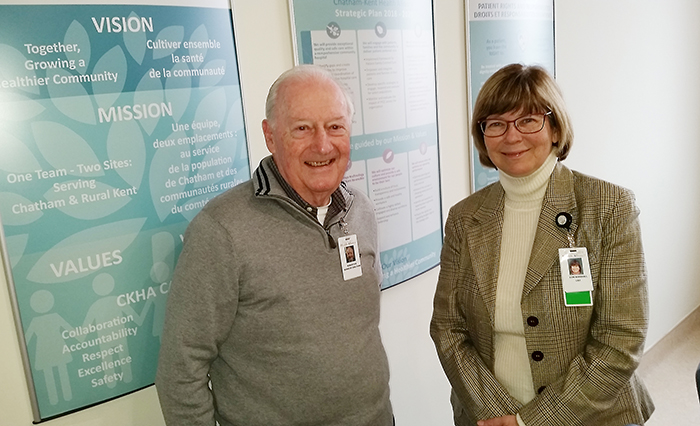
The Chatham-Kent Health Alliance is ready for this winter’s sickness surge, according to its boss, Lori Marshall.
The president and CEO of the CKHA said as winter sets in, there are annual surges in patient volumes. This year, the Erie St. Clair Local Health Integrated Network (LHIN) has allotted $302,500 in one-time funding to address such a surge.
Marshall said between now and the end of March, the alliance will open five additional hospital beds and staff them.
The funding comes after the CKHA last year addressed patient surge without having LHIN funding in place.
“Staff and physicians demonstrated a great response to increasing capacity last year,” Marshall said. “We were able to show our ability to the LHIN.”
They received funding after the fact last year. This time around, the cash comes up front. Marshall said that allows for better planning.
“Last year, the bed surged was not allocated by the LHIN. We presented data back showing we had to increase bed capacity for a period of time,” she said.
But this time around, “being able to plan is much different. Better planning equals better preparedness,” she said.
That involves hiring more staff, including two full-time nurses hired to temporary positions to help address the anticipated surge, and supplementation by part time personnel.
The surge planning was just one element of updates alliance officials supplied to the media at a press conference Friday.
Lisa Northcott, vice-president at the CKHA, said work continues on cultivating a culture of safety at the alliance, as officials have developed a patient safety plan.
“In terms of developing a patient safety plan, there was a lot of opportunity for improvement and it showed we had a long way to go,” she said.
The plan places an emphasis on the processes and practices at the alliance, she added. When mistakes are made, she said the plan is designed to learn from them.
Marshall said the majority of errors that occur at a hospital are related to the policies and procedures.
“We’re moving towards where we can make sure to report errors so we can learn from them,” she said. “We are shifting to a just culture, not a blame culture.”
Northcott said when an error occurs, it can be quite traumatic for the individual involved.
Marshall said the changes in culture will show a major shift in people feeling more comfortable in reporting any errors.
Hospital officials have also developed an infographic as a quick reference chart to track improvements at the CKHA.
Bob Dye, acting chair of the CKHA board while board chair Greg Aarssen takes a leave of absence for personal reasons, said board members are still getting used to their roles.
“The board is less than a year old. It is filled with all new individuals and many of them are new to roles in health-care governance,” he said. “We’re looking at how to measure results, looking at what companies call a balanced scorecard.”
Notable early results show an increase in staff satisfaction of eight per cent, and a 15-per-cent increase in the number of people who received knee replacements within the Ministry of Health’s targeted timeline.
Dye pointed out there were 14.5 fewer days lost due to injury at the CKHA this year.
The planning also provided early estimates that the alliance would have a balanced budget in the 2019-20 fiscal year, he added, but with caution.
“We still don’t have all the parameters of what the LHIN wants from us,” he said.
The LHIN oversees health-care spending in southwestern Ontario west of London.
Marshall said the infographic would be updated quarterly.
The alliance has also created innovation grants, setting aside $50,000 in $1,000 and $10,000 chunks, seeking input from staff and volunteers on ideas that could make a difference for patients or staff at the CKHA.
A committee will determine which ideas get pursued.
“There are a lot of great ideas out there. Sometimes it doesn’t take a lot of money, just a spark,” Marshall said.
Marshall said the alliance is adjusting its human resources planning, as the HR department recently presented a report to the board, including information on how Millennials like to work.
“We have to factor that into the future. We know we have an aging workforce,” she said.
Millennials, she said, like a lot of feedback, immediate feedback.
“They’ve been socialized through school. They get instant feedback,” she said.
They also like to be involved, to be part of a cause, Marshall added.
“The key to attracting Millennials and retaining them is to make sure we engage their hearts as well as their heads,” she said.
A challenge, however, is the desire by Millennials to have very flexible work hours, something that is difficult to provide at a hospital that is running 24/7, Marshall said.






